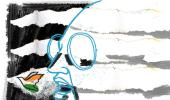While the Supreme Court on Wednesday ordered a stay on filing cases under the British-era sedition law, various courts in the recent past have been critical of the draconian law and have in some cases penalised petitioners who sought invoking of its provisions.

In March last year, a petition was filed in the Supreme Court by Rajat Sharma and Dr Neh Srivastava who demanded that a former Jammu and Kashmir chief minister be booked under the sedition law, claiming he had sought China's help to restore the erstwhile state's special status.
A bench of justices Sanjay Kishan Kaul and Hemant Gupta not only rejected the plea but also imposed a fine of Rs 50,000 on the petitioners for making such claims, and directed them to deposit the amount with the Supreme Court Advocates Welfare Fund.
The bench had observed that the expression of a view which is different from a decision taken by the central government itself cannot be said to be seditious.
The court maintained that "dissent" is a form of free speech and expression.
In the case of Disha A Ravi, popularly known as the 'Toolkit case', the activist was arrested on February 13, 2001 from Bengaluru and brought to Delhi.
She was released 10 days later, and in the bail order, additional sessions judge Dharmender Rana said the perusal of the 'Toolkit' revealed that any call for any kind of violence was conspicuously absent. "In my considered opinion, citizens are conscience keepers of the government in any democratic nation. They cannot be put behind the bars simply because they choose to disagree with the State policies."
A case was registered by the Ladakh police against two individuals, Zakir Hussain and Nissar Ahmed, in June 2020 for making comments on a viral audio clip containing an alleged objectionable conversation that purportedly demeaned the country's armed forces during the clashes between the Indian Army and the Chinese armed forces in the Galwan Valley of Ladakh.
The Jammu and Kashmir High Court quashed the FIR as well as the final report filed by the police, saying that no sanctions had been taken by the police from competent authorities.
In the case of Rajina Parbin Sultana from Assam, who was detained in May 2021 under the sedition law, she was accused of having lunch on a cloth that resembled the Tricolour.
While releasing her on a bail bond of Rs 20,000, the Gauhati High Court said that prima facie, it does not suggest to be an act that could have the affect of subverting the government by bringing that government into contempt or hatred or creating disaffection against it. The court instead said that she could be tried under the Prevention to Insult of National Honour Act, 1971.
The Himachal Pradesh Police had drawn flak from the highest court of the country last year when it filed a sedition case against noted journalist Late Vinod Dua. While quashing the case against Dua, the Supreme Court observed that "every journalist is entitled to protection under the Kedar Nath Singh judgment (the famous verdict of 1962 on the scope and ambit of offence of sedition in the IPC)".
While upholding the validity of section 124A (sedition) of the IPC, the top court in 1962 had ruled the sedition charges could not be invoked against a citizen for criticism of government actions as it would be in conformity with the freedom of speech and expression.
Dua had been served a notice by the Himachal Pradesh police in June 2020 to appear before the Kumarsain police station in connection with an FIR lodged against him on charges of sedition. However, the process was stopped by the Supreme Court on June 14, with the court asking the police not to take any coercive step.











 © 2025
© 2025